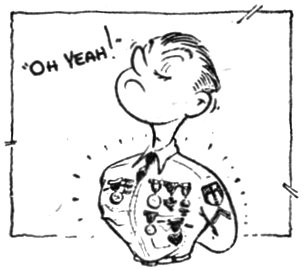
VOL. I NO. 36 REG. NO. L5015 DELHI, THURSDAY MAY 20, 1943.
10th Air Force Strikes Hard At Jap Bases
|
China-Based Fighters Wallop Jap Invaders Of 40 Jap bombers and fighters which raided Kunming recently, 15 were destroyed and 10 more were probably destroyed by American P-40's which intercepted and chased the mission off in disorder. According to the brief report, a few bombs were dropped harmlessly on the outskirts of the city. Meanwhile, a news item reaching the Roundup from the War Department reveals that Lt. Charles Chrysler, of Kenmore, N.Y., shot down four out of five enemy planes on a combat mission. |
The Jap in Burma received no letup as bombers and fighters of the 10th Air Force continued to hammer at his communications and bases throughout the week. A thumbnail sketch:
MAY 12 - B-24's scored direct and near hits with 30 pound bombs upon the Sinthe Railroad Bridge. A second formation of heavy bombers attacked Bassein and registered hits along the river front. P-40's armed with light demolition and fragmentation bombs, pounded several Jap installations in northern Burma.
MAY 13 - B-25's swooped upon the railroad yards at Mandalay and the railroad bridge at Myitinge. The Mandalay formation scored hits on the main station, rolling stock and storage sheds. The formation striking at the bridge was intercepted but the enemy fighters were driven off. Other B-25's struck at the railroad installations at Thazi Junction and the airdrome at Shwebo. There was enemy interception over Shwebo. Two enemy were destroyed, two probably destroyed and three damaged. B-24's struck hard at targets at Martaban Point and Moulmein. One of our aircraft failed to return during the day's missions.
MAY 14 - B-25's directed their efforts against railroad installations at Myingyan and Nyaungbinwun. One formation of B-24's employed 18 tons of bombs against targets at Prome - a 200-foot river boat, wharves, railroad yards and buildings. Another heavy bomber formation smashed at Jap headquarters at Myitkyina with 14 tons of bombs.
MAY 15 - B-24's hacked at the railhead of the Burma Road at Lashio. Bombs burst among the enemy barracks and electric power station; explosions followed hits upon petrol dumps. Other B-24's staged a successful attack upon military installations at Tavoy on the Tenasserim Peninsula. Our medium bombers hammered railroad installations in central Burma at Sedaw, Alon and Namkam.
MAY 16 - Several B-25 formations made concerted attacks: 1 - Smashed railroad installations in the Shwebo area, railroad yards at Moksogyon and warehouses at Magyizauk with 10 tons of bombs; 2 - directed even more bombs at Zigon, where fires were set that could be seen 50 miles away; and 3 - scored hits upon rolling stock at Wetlet and Paukkan.
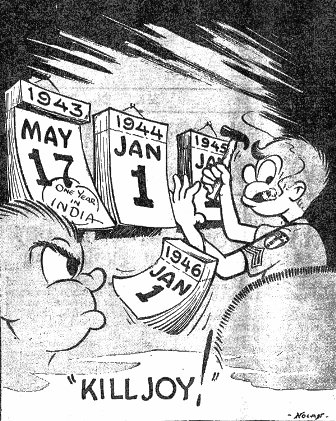
|
By Sgt. JACK BLUMENFIELD
Officers and enlisted men who disembarked from the Brazil one year ago, May 17, celebrated the occasion with rousing fun-fests throughout the C.B.I. Theater. This group of G.I.'s and their officers made merry in shindigs which ran the gamut from elaborately-planned affairs to impromptu get-togethers.
Locally, the program was typical. S/Sgt. Jack Nolan, whose famous C.B.I. cartoon character was named "Gee Eye" by the "Brazilians," painted a poster which was displayed at the entrance to the dance hall. The poster pictured little Gee Eye looking dazedly up at his forehead and remaking of the "S" which was stamped there: "What will they think of next?"
Just as Nolan's cartoons set the tempo for humor on the Brazil, so did they set the stage on this anniversary, for as each person arrived at the hall, he or she was stamped with that same "S." Shades of the Brazil! (There was one unforeseen repercussion locally. Locals, when they saw nurses, Red Cross girls, officers and enlisted men wandering around town with stamped foreheads, spread the rumor that there had been a mass American wedding.)
MANY THEORIES
There have been many theories proposed concerning the reason why the seafarers were suddenly branded while on the high seas. The favorite version is that the "S" stands for Stowaway - and a beautiful blonde at that. The captain never made any explanations for this strange ritual, so the story goes, for he finally found her.
But that as it may, there was excellent reason for the good spirit of these celebrants. A little over a year ago they were riding the waves, living on a steady diet of hardboiled eggs and salt water. They had suffocated at the equator behind closed portholes in quarters that were far from being air-conditioned. It was a rough trip, chums.
COME LONG WAY
The Brazilians have come a long way since then. Enlisted men like Pvt. Paul Shebby, S/Sgt. Segerstrom, T/Sgt. Richard Smith, T/Sgt. Kenneth Harris and Pfc. Joseph DiMarco have received commissions. Officers like Capt. Joe Walker, Capt. Elmer Tarbox, Capt. Vick Winter, Lt. Detchemenday and Lt. Hubert Nolan have gathered up a galaxy of medals which include the Air Medal, the D.F.C., the Silver Star and the Purple Heart. For these men, as well as the others who haven't had such brilliant success, it has been a year of hard work in China, in India, and over Burma.
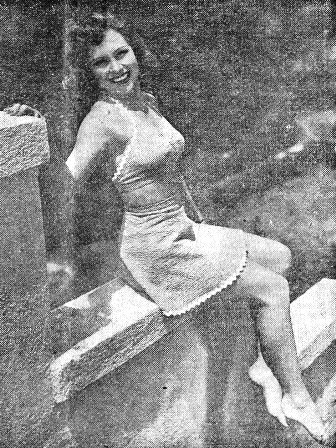 Sometimes we wonder whyinell we bother to write captions for the Roundup's page one cheesecake. Chances
are no on reads 'em. Today we introduce Patti McCarty. Mmm mmmm.
Sometimes we wonder whyinell we bother to write captions for the Roundup's page one cheesecake. Chances
are no on reads 'em. Today we introduce Patti McCarty. Mmm mmmm.
|
Brothers Meet Here During Church Service
Cpl. Henry Ortiz, of Albuquerque, is just about the happiest Yank in India. Sunday, he met his brother, Reuben, whom he had not seen since he left the United States over a year ago.
Henry, who usually goes to church at the cathedral, decided to attend services at the barracks. His brother, who just arrived in India, came in to the services and, upon seeing Henry, knelt behind him. After church, Henry turned around to leave, when Reuben grasped his hand and said: "Hello, Henry, how are you doing?"
In December, 1941, Henry and Reuben tried to enlist in the Army together, but Reuben was rejected. Shortly afterwards, Henry went overseas. Reuben tried again to get into the Army, but all in vain. He then turned to the Marines and the Navy, but was rejected. Finally, his number in the draft came up and he was inducted, despite his previous rejections. Two months ago, Henry received his last letter from his brother. He figured Reuben was in Africa.
Now that Henry is united with his brother, he hopes they will be able to be in the same company and will not be separated.
POST OFFICE SMILES UPON KHAKI-CLADS
G.I.'s in C.B.I.-land have been smiled upon by the Army Post Office. From this day, announces the War Department, parcels which (1) don't push the scales past the five-pound mark, (2) do not exceed a dainty 15 inches in length and girth added, may be sent to overseas khaki-clads.
One such package may be sent per week. It is not required, as previously, that approval first be obtained from the G.I.'s unit commander.
 CREDULOUS PHILLY GULPS BAIT
CREDULOUS PHILLY GULPS BAIT
Until the Roundup started investigating, it appeared, to our chagrin, as if the Philadelphia Evening Bulletin had scooped the hell out of us. And, according to its own nation-wide advertising, "almost everybody reads the Evening Bulletin." Reported the Philly fishwrapper, Pfc. Bob Blitman, a native son, was back in town from the C.B.I. Theater - and a good thing it was for the Jap, too. There was Master Blitman's picture, spread over two columns and looking as grim and fearless as William the Conqueror. A sob sister for the Philly sheet had rhetorical diarrhea for four columns of solid type telling how Blitman, a one-man gang, had practically driven the Jap out of Burma single-handed. On the strength of the newspaper story, Blitman had made several public appearances and the outline of an extended lecture tour began to take shape.
And the Roundup, sound asleep, had not devoted as much as a single line to the hero's departure for the States. This, admittedly, was gross journalistic negligence on our part - until the facts were gathered and appraised. Then the Evening Bulletin started to look as bad as mustard on ice cream. The glib Blitman had very neatly pulled the wool over the paper's eyes. Truth of the matter was that Blitman, after arriving at a West India port on the Brazil, had never left its confines. This rugged Jap-fighter had earned his private first class (plus 20 percent overseas) pay for toting mail. Upon discovery of the hoax, Maj. Gen. Clayton L. Bissell, commanding general of the 10th Air Force, sent all pertinent information to the Commanding General, Army Air Forces, Washington, D.C. "If disciplinary action is taken," he asked, "it is requested that this Headquarters be informed, as dissemination of such information will undo the harm done and at the same time discourage others from passing on similar untruths." Feast your eye on this trenchant sentence in the first paragraph of the Philly sheet's yarn: "Gold and silver stars indicate the campaigns of Rangoon and Lashio." Or a sentence in the following paragraph: "He looks as if he might have been playing a part in a high school play instead of roaring through hot Oriental skies these past months." (You're not kidding, sister.) After regaling the sob sister with the stories of two whirlwind courtships, the irrepressive Blitman next told of his exploits in China. It was in Kunming (he reminisced) that he met Gabby. But she was an American, through and through, sleek, efficient and beautiful, a Flying Fortress (Nobody in Kunming has yet seen an operational B-17.) The battle of Burma was in full swing and there was no time to lose. He was promptly hustled into Gabby - to start, he confided to the credulous sob sister, 78 combat hours over Rangoon and Lashio. Here our hero got his dates a little mixed. The battle for Burma was completed before the Brazil snuggled into dock. Then tragedy struck. Blitman was too slow getting into a slit trench. A bomb fragment knifed his knee. "There was so much noise," he related, "that it burst an ear drum, too, and I wasn't much good for a while." Suddenly our hero began to notice he needed oxygen at 8,000 feet when the others didn't use it until 14,000 feet. (The altitude at the West Indian port, where Blitman was a model mail orderly, was at sea level.) "Alas," he confided, "the medicos informed me that I had asthma and sent me home." It was a grim war for Master Blitman. |
Standing squarely astride the supply line to the C.B.I. Theater are the husky soldiers of the Army Service Forces port battalions. Most of these Negro troops had never been near a ship or dock before they came into the Army. Now they scramble up a ship's gang-plank like veterans and help transform a stream of supplies into a mighty river. They know speed is economy - a ship in port is a liability. Originally infantrymen at Jefferson Barracks, La., the company pictured on this page received its early training on the New Orleans docks, later during the Louisiana maneuvers. They arrived in India a year ago and have unloaded what must remain an undisclosed number of ship tons in record time - night and day, 24 hours a day, seven days a week.
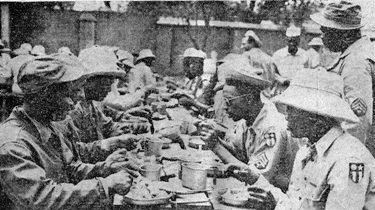 Nothing like a hearty breakfast to start off the day. There's plenty of work to be done.
Nothing like a hearty breakfast to start off the day. There's plenty of work to be done.
|
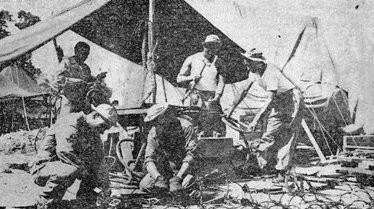 When a particular type of equipment is not available, they devise their own.
When a particular type of equipment is not available, they devise their own.
|
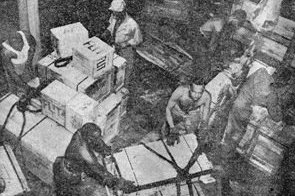 Cargo is unloaded quickly so the ship may return for more.
Cargo is unloaded quickly so the ship may return for more.
|
 Cpl. Menre Collins gets his hair cut by Pvt. Bill Joiner, while Pvt. Joe Bryant shaves himself.
Cpl. Menre Collins gets his hair cut by Pvt. Bill Joiner, while Pvt. Joe Bryant shaves himself.
|
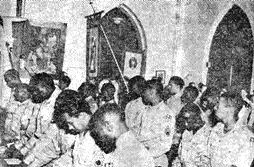 The soldiers find a church far from home. The padre is delighted to welcome them into his place of worship.
The soldiers find a church far from home. The padre is delighted to welcome them into his place of worship.
|
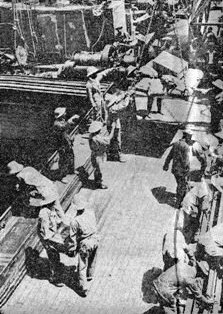 Once hatches are open, strong backs start bending toward the task of unloading the ship. Every man knows his job well.
Once hatches are open, strong backs start bending toward the task of unloading the ship. Every man knows his job well.
|
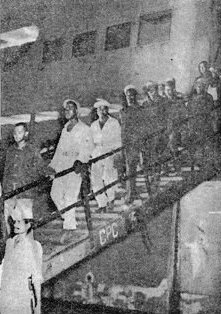 Work continues - from dawn to dusk. After dark, soldier-stevedores come down the gang-plank past an ever-present
Indian sentry.
Work continues - from dawn to dusk. After dark, soldier-stevedores come down the gang-plank past an ever-present
Indian sentry.
|
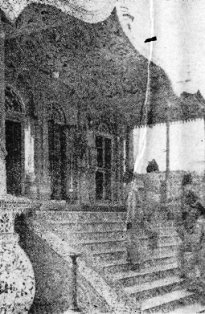 In stocking feet, the soldier-stevedores visit an Indian temple during off-duty hours.
In stocking feet, the soldier-stevedores visit an Indian temple during off-duty hours.
|
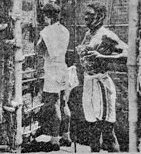 Sgts. Whaley and Oliver jump under the refreshing showers.
Sgts. Whaley and Oliver jump under the refreshing showers.
|
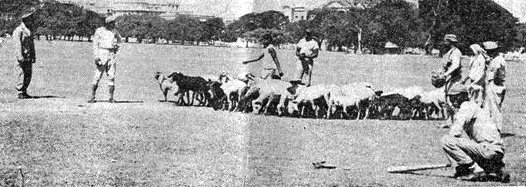 An official "time out." The baseball game is obligingly halted to allow and Indian gederya (shepherd) to guide
his little flock across the diamond. Soon the contest is started again, to the bewilderment of the Indians.
An official "time out." The baseball game is obligingly halted to allow and Indian gederya (shepherd) to guide
his little flock across the diamond. Soon the contest is started again, to the bewilderment of the Indians.
|
Hero Unscrews Tail Fuse From 'Live' Explosive
EAST INDIA BASE - He isn't wearing any medal - at least not yet - but Pvt. Malcolm Trombley is rated a hero by the men of the medium bombardment squadron with which he serves.
Part of a group of ordnance and combat men - about 15 in all - loading bombs recently, Trombley probably saved the lives of all, as well as several airplanes, when he coolly unscrewed a smoking tail fuse from a bomb accidentally made "live" and cast it to the ground, while bystanders fled into the nearby jungle.
An investigation of the accident failed to reveal the exact cause of the bomb mishap, but fellow ordnance men and the other bystanders agree that Trombley's coolness, fast thinking and courage probably saved them all from a ghastly and untimely death.
The type of bomb involved in the incident is effectually destructive within a radius of 150 feet of

SHIP ME ANYPLACE Ship me anyplace, I'm a Yankee fighting man. Ship me anyplace and I'll do the best I can. I'm not a flashy hero or one of your men among men. I'm just an ordinary Yankee, just what I've always been. I don't want any glory or claim any homage due. Just give me my own sweet home when this bloody war is through. I'm in action everywhere upon the broad face of the earth. Down under in Australia from Darwin south to Perth. Across the vast Orient from Karachi to Chungking. From Bangalore in India up in China to Kunming. I'm stationed in North Africa to give the Axis hell. And, going south to Capetown, you'll find me there as well. On the islands that dot the Pacific, I've gained a firm control. Japanese fleet beware, America is collecting her toll. I'm living in merry old England in fog and in sunny clime. I'm helping my British cousins to rid the world of crime. Wherever I face my enemies, be they Jap or bloody Hun. They'll damn soon know they're fighting a tough American son. We all must die sometime. What could be a better way Than serving the country we love, the good old U.S.A.? I couldn't think of a better way. We all must die, you see. And my life will not have gone in vain, maintaining liberty. Ship me anyplace, any old place at all And when the battle is ended, if I don't answer the call, From right where I have fell, lay me away to rest. Stand above my grave and say: "Here lies one of the best." Ship me anyplace I'm a Yankee fighting man. Ship me anyplace and I'll do the best I can. - By Cpl. HOWARD C. ALLEN |
The day after the accident, the following notice appeared on the bulletin board of Trombley's squadron:
"This notice written and posted anonymously is to give proper tribute to Pvt. Trombley, who, in the face of grave danger to himself, did remove from a demolition bomb the tail fuse which had been accidentally made live. We, the fellows whose names do not appear below, who came so close to saying "hello" to St. Peter, offer Pvt. Trombley our thanks and are sorry that we don't have the power to award him a medal appropriate to the bravery displayed."
A modest, unassuming guy, Trombley is 27 years old. His home is in Osseo, Minn.
Hospital Ship Sunk By Jap Submarine
SOUTHWEST PACIFIC - The Australian hospital ship Centaur went down off Brisbane with the loss of 295 lives, as the result of an indiscriminate Japanese submarine torpedoing.
Enroute from Sydney to New Guinea, the Centaur was fully illuminated and marked with the Red Cross insignia and complying with all the provisions of international law.
Of the 363 members of the crew, medical staff and nurses aboard, only 64 were rescued, including one woman. The ship sank three minutes after the attack.
BANTAM CAR COMPANY DEVELOPED U.S. JEEP
WASHINGTON - The Federal Trade Commission reported that the American Bantam Car Co., "collaborating with certain U.S. Army officers," developed the Jeep.
The statement was made in connection with the commission's complaint against the Willys Overland Motor Co., charging that Willy's advertising was misleading and misrepresented the facts by claiming that they had created the Jeep.
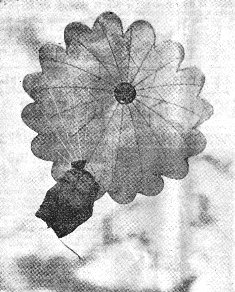 U.S. troops at a lonely outpost "somewhere in the weeds" look anxiously skyward and watch their supplies float down
to them by parachute from a transport plane.
U.S. troops at a lonely outpost "somewhere in the weeds" look anxiously skyward and watch their supplies float down
to them by parachute from a transport plane.
|
Target --- Remote U.S. Outpost;
Plane's Mission Constructive
By TOBY WIANT Associated Press War Correspondent
WITH AMERICAN AIRMEN OVER NORTHEAST INDIA - There are thousands of queerly-shaped white clouds all around us, and our pilot, Flying Officer Wendell Currier, 21, of Klamath Falls, Ore., dodges them as skillfully as Joe Louis does a potential haymaker.
They aren't particularly dangerous, but visibility inside them is zero. We must see where we're going, because we're on an important mission.
Our target isn't at all like those I've seen while flying in bombers over the Western Desert, Burma and Thailand.
We aren't going to bomb docks, or arsenals, or refineries, or motor transports, or troop concentrations - or any other such targets that bombardiers dream about.
This is a constructive mission - not destructive.
Our target is a remote American outpost, deep in the jungle-matted hills where white men are as rare as cobras in Kalamazoo. The Yanks on duty there are many days' march over back-breaking hills from anywhere.
They must be supplied by air - and that's our job for today.
Our plane is full of bundles. Parachutes are attached to some of them. They contain rice, dal (split peas), vegetables, condensed milk, sugar, salt, beans, tumeric (spices), chilis (red peppers), tea, cigarettes,
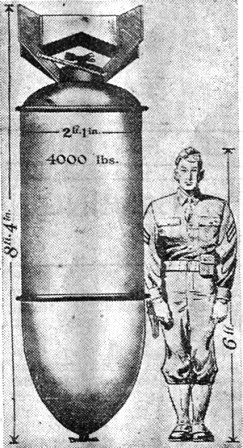 This diagram shows the size of the 4,000-pound blockbuster, biggest bomb ever to be made - now being dropped on
Axis-held territory in Europe, night and day.
This diagram shows the size of the 4,000-pound blockbuster, biggest bomb ever to be made - now being dropped on
Axis-held territory in Europe, night and day.
|
We are nearing what appears to be a solid wall of clouds, but Currier and his co-pilot, Lt. Ted Carmack, 26, of Brewton, Ala., find a hole and zig-zag into the clear. We can see the hills plainly now. Their primitive beauty is breath-taking. They give me that back-to-nature feeling.
I glance over at the other observer on this trip - Capt. Luther Davis, 26, of New York City, who wrote for magazines such as Colliers, New Yorker, Vogue and Liberty before becoming an Air Corps intelligence officer. His nose is pressed flat against a window. He's staring intently at the hills. He'll probably write a play about this someday.
"We're just about there," says Pvt. John Budrich, 24, of Brooklyn, N.Y.
"How can you tell?" I ask. All the hills seem the same to me.
"I've done this so often I just know," he replies.
Now I see out target, a little clearing atop one of the lower hills. These fellows will have to be hot shots to hit that.
Our plane noses down until we're below the higher peaks and close to the trees. We circle the clearing once, then Budrich and his buddies - Pvts. Edward Porter, 21, of St. Louis, and Joseph W. Aubin, 21, of Sacramento - jump to their positions.
They drag the first bundle to the open door of the plane. Carmack flips on the green light signaling them to shove it out. I keep my eyes glued on the bundle. The parachute opens. The bundle floats down gently - right onto the clearing!
We make another run - and another hit: These guys are good.
A different technique is used to drop the bundles without parachutes. This crew is good at that, too. Not all the bundles land squarely onto the clearing, but most do.
Now the plane is empty, and we climb to get over the hills.
I congratulate Currier on the success of the mission.
"Aw," he says, "we do this every day. It isn't the kind of fighting I thought I'd be doing, but every bundle that lands on the target is at least a left-handed slap at the Jap."
'BUFFALO BILL' HONORS WON BY SERGEANT
By PRESTON GROVER United Press War correspondent
NORTHEAST INDIA BASE - Marksmanship honors for this neck of the woods goes to Sgt. Robert L. Cauley, Dallas, Tex. He knocked off four buffalo with five shots, supplied his outfit with fresh meat for several days and cost Uncle Sam 300 rupees. And it is still a bit of a mystery.
Cauley was just a corporal when it happened. He was keeping his eye on a band of Indian coolies on a construction job. Suddenly, a coolie raced out of the jungle into the construction clearing hotly pursued by a buffalo with horns as long as your arm. Cauley's job was to protect the coolies, so he shot the animal. In quick succession, three other buffalo raced out of the jungle, horns down. Cauley said, evidently intent on getting that coolie.
Calmly, he shot them all, one shot apiece for three of them, two for the fourth.
The coolie laborers were awarded one buffalo for their mess. They were grateful. The American outfit took the other three. Later, a Naga headhunter villager showed up with a claim that all four were his buffalo. Uncle Sam shelled out Rs. 300 for them.
There has been some speculation as to whether the wily coolie did not get the buffalo to chase him so it would be shot. Also recommendation for Cauley's promotion from corporal to sergeant arrived on the regimental commanders desk the same morning as the report of the incident. J. E. Moyer, Jr., of Tuskegee, Ala., then captain but now major, insisted he had made the recommendation for promotion before the shooting.
"It was the best beef we've had up here," Moyer summarized.
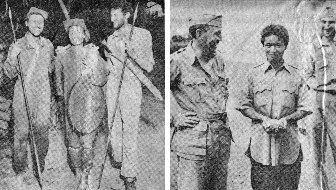
|
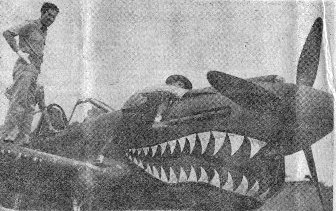
|
|
THE OLD AND THE NEW 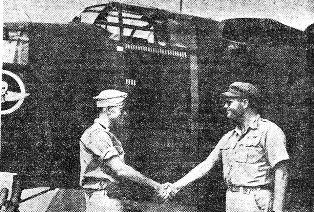 Popular Maj. James Philpott, left, wishes the best of luck to his successor as C.O. of the Skull and Wings medium
bomb squadron, Capt. Robert McCarten. Philpott has been moved up.
Popular Maj. James Philpott, left, wishes the best of luck to his successor as C.O. of the Skull and Wings medium
bomb squadron, Capt. Robert McCarten. Philpott has been moved up.
|
McCarten Philpott's Successor
As C.O. Of Skull And Wings
By Cpl. LEE KRUSKA
EAST INDIA - Twenty-nine-year old Capt. Robert D. McCarten, "big, strong, silent man from North Dakota," has become commanding officer of the Skull and Wings, East India medium bomb squadron. He succeeds Maj. James A. Philpott, one of America's top-ranking pilots, who has been transferred to group headquarters in an executive capacity and is in line for a promotion.
Equally popular with officers and enlisted men alike, McCarten is well qualified for his post, having had previous experience in supply, engineering and administration. One of the most thorough fliers in this Theater, he should have no trouble proving himself a capable commanding officer. In addition to his skill as a pilot, he is also a qualified pistol expert, military specialist and aerial-gun and bombardier expert. Photography has long been his hobby.
ENLISTED IN 1939
A handsome, strapping six-footer, McCarten was an accountant in civilian life. A graduate of North Dakota Agricultural College in 1935, he enlisted as an aviation cadet in the ACAFS in 1939. Previous military experience was as an ROTC cadet from 1931 to 1933 and in the National Guard from 1934 to 1939, rising to rank of sergeant in the latter organization.
Strictly a man of action, the new CO's favorite sports in college were boxing and track, in which he distinguished himself to such an extent that he served for a time as an instructor. His boxing prowess reached a high point in 1936 when he was crowned regimental heavyweight champion while serving in the national Guard.
'I'M NO ACTOR'
Typical of McCarten's honest modesty, despite his many accomplishments, is his comment when photographer Cpl. Lee Johnston requested that he pose for an individual shot for publicity purposes. "Picture? No! I'm no Hollywood movie actor," he emphasized with finality.
P.S. The captain didn't know this shot above (taken previously) would wind up in the inner sanctums of the Roundup office.
Philpott, his predecessor, has been in command of this outfit since activation last September. Through his inspiring leadership, it has become one of the crack outfits in the CBI Theater. His parting words: "It almost breaks my heart to leave you boys, but don't forget I'll be plugging for you."
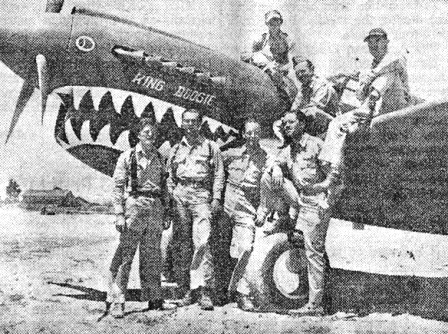
|
FOR JAPS
Fighter pilots of the 14th Air Force have been erasing Jap planes out of the skies with regularity during the past three weeks. These pilots recently drove into a formation of bombers and Zeros and, though greatly outnumbered, knocked down 10 confirmed and eight probable enemy. Left to right seated on the fuselage: Maj. Edmund Goss, Lt. Col. John Alison, and Lt. Roger Pryos; standing on ground: Lt. Joe Griffen, Lt. Mack Mitchell, Capt. John Hampshire, and Capt. Hollis Blackstone. This was the last picture taken of Hampshire, who was later shot down after he had bagged 14 confirmed Jap planes to become the Theater's leading ace.
INTEREST WANED
NEWARK, N.J. - Last month Selective Service Board No. 2, Union Township, N.J., asked the FBI to be on the lookout for William Koenig, 29, as a draft delinquent.
Recently Koenig was picked up. Koenig produced papers to show he was registered with the Maritime Commission, had been torpedoed four times, and had once spent 22 days on a life raft with 17 men, only six of whom survived. He also showed them fresh shrapnel wounds in the back.
Neither S.S. Board No. 2 nor the FBI is longer interested in Koenig.
|
The 10th Air Force has announced the awarding of 284 medals to officers and enlisted men. Of these, 104 received the Distinguished Flying Cross, 148 the Air Medal, eight the Silver Star, three the Oak Leaf Cluster to the Air Medal and one the Order of the Purple Heart. |
|
Lts. Frank H. Paschang, Russell R. Pickett, Dean L. Rounds, Eugene M. Havey, Thomas D. Higgins, Jr., William S. May, Kenneth E. Padgett, William C. Powell, Robert D. Shreve, Paul P. Streitz, Cecil D. Williams, Franklin F. Yong, Melvin E. Bunch, Matthew C. Colley, Jack M. Collier, Freed K. Darragh, Jr., Harlan W. Gessner, Thomas G. Hay, James W. Hitchcock, Rae C. Kelley, Bruce L. Kreighbaum, Elmer B. Lynn, Samuel D. McBride, William A. McCauley, Frederick M. Pendoley, Jr., Laurence D. Putnam, Harry B. Ruble, James P. Segel, Charles H. Stehling, Eugean M. Watson, James M. Hamilton, Joseph W. Cunningham, Max J. Greenstein, Thomase B. Dyer, Dewey D. Busch, Clyde C. Cannon, John F. Charnell, Walter C. Stewart, Jr., Leonard A. Swanson, Richard L. Weis, Gordon H. Wilson, Joseph E. Byrne, Joseph B. Coambs, Hugo R. Ranz, Jr., Earl W. Healzer, Raymond A. Malloney, Paul J. Paskey, Phillip K. Stevens. Flight Officers: William J. James, Thomas C. Blackshear, Cyrus F. Carter, Jr., Joseph F. Crane, Gilbert G. Fincher, Lloyd L. Marlaire, Robert C. Martin, Jr., Richard W. Plummer, James H. Short. T/Sgts. Robert G. Downs, James W. Smith, Goerge S. Van Dyke, Raymond C. Zilikowski, John L. McCarthy, Arthur J. Darling, James A. Fisher, Charles Steinberg. S/Sgts. Claude Daniels, Raymond E. Flood, Ronald B. Fuller, Richard E. Hoover, Adrian B. Phillips, Dales B. Russman, William H. Williams, Donald E. Gatchell, Clyde H. Mitchell, William W. Smith, Charles E. Wilderman, William J. Hunter, Robert L. Eletcher, Adrew J. Gillespie, Frank B. Hobbs, Richard C. Johnson, Raymond J. McGeehan, John H. McNeill, Jerald O. Peck, Lawrence D. Rademacher, Leonard C. Reynolds, Stanley W. Schmiett, Alfred T. Stank, Sidney S. Tronic, Albert A. Wagner. Sgts. Tucker W. Byas, Glen P. Davis, Ralph S. Kaplan, John H. Kmiecik, Hugh J. McMillan, Joseph S. Panepinto, Henry E. Pickett, Virgil C. Howard, Clarence P. McGee, Samuel B. Blain, William H. Potthast, John S. Simms, Jr., Frederick V. Sunday, Vernon F. Willette. Cpls. William N. Crandall, Samuel J. Davidson, Fred C. Fishbaugh, John M. Gallagher, George A. Grine, Henry J. Jankowski, Patrick E. Inipshield, William B. Malick, W. Maloney, Leland C. Purvis, Robert J. Terry, Richard D. Thomas, Marlow L. Zimmerman, Pvt. Vernon L. Thorson. |
|
Lts. Verl C. Athey, Melvin E. Bunch, Matthew C. Colley, Jack M. Collier, Fred K. Darragh, Jr., Ronald J. Fruda, Harlan W. Gessner, John R. Humphries, Samuel D. McBride, Albert K. Moore, Frederick M. Pendoley, Jr., Thomas Ridgway, Jr., Gerald R. Shawder, Charles H. Stehline, Harrie L. Stewart, Harry M. Yedor, Troy Drew, Elmer Morse, Herbert F. Wunderlicht, Frederick C. Bock. Flight Officers Cyrus F. Carter, Joseph F. Crane, Robert C. Martin, Jr., M/Sgts. F. Lindley, Stephen Ziminski. S/Sgts. Irving V. Flax, Joseph J. Kowalski, Clde H. Mitchell. Sgt. Clarence P. McGee, Cpls. Fred C. Fishbaugh, George A. Grine, Lealnd C. Purvis, Richard D. Thomas. Col. Cecil E. Combs, William E. Basye. Capts. John H. Anderson, John R. Bechtel, Bobby A. Cook, James B. Fornasero, Bernon C. Johnson, Jack O. McReynolds, Rowan N. Neff, William D. Owens, Charles A. Renn, Albert J. Roberts, Jr., Howard C. Ross, William I. Sanders, Forrest G. Smith, Shirl H. Swenson, Hugh E. Wild. Lts. Joe H. Deer, Vernon L. Scott, John W. Spiegelberg, Calvin C. Lombard, Marvin Siegel, James H. Weaver, Alfred J. Wood, Thoms B. Dyer, Robert E. Melton, George E. Sloan, Frank J. Milatzo, Robert J. Shimanek. T/Sgts. John E. Craigle, Frank E. Gates, John C. Cehay, Roy R. Hagerich, John W. Imre, Robert A. Mayotte, William C. Rooney, Peter Seman. S/Sgts. John L. Bates, Bernard L. Bennett, William D. Robert, Adolph Scolavino, Robert P. Thomas, Marvin E. Varnado. |
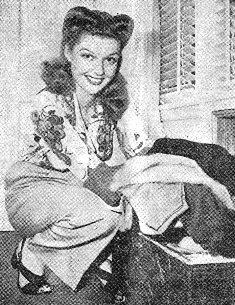 Sweater-conscious Ann Sheridan, the oomph gal, packs away her form-fitting sweaters in moth balls. Serving
as Special Commissioner in charge of the War-Time Sweater problem, Ann remarked that the problem may be divided into
two parts: "Big sweaters and little girls cause accidents; little sweater and big girls are a union that make men
whistle when they should be working."
Sweater-conscious Ann Sheridan, the oomph gal, packs away her form-fitting sweaters in moth balls. Serving
as Special Commissioner in charge of the War-Time Sweater problem, Ann remarked that the problem may be divided into
two parts: "Big sweaters and little girls cause accidents; little sweater and big girls are a union that make men
whistle when they should be working."
|
Lush, Glamorous Female Awaits
Lonely Lad's Return To Billet
By Pvt. G. W. TIDD
EAST INDIA BOMB SQUADRON - Long shadows hurried across the rice paddies before the Indian night fell black as a buzzard's wing. Joe straggled into his billet and stopped to touch a match to his lonely lamp. Glancing up, his eyes met and were held by the languorous orbs of a scantily-clad woman, who waited just within the circle of yellow light. His eyes bulged as he stared at her... a woman alluring, provocative, whose red lips promised Paradise. Joe gulped, his pulse beat faster. Emotion choked him. Within reach of his hungry arms, she stood, a creature of flaming passion. For a moment he hesitated, longing to crush her to him. Then he sank back with a bitter
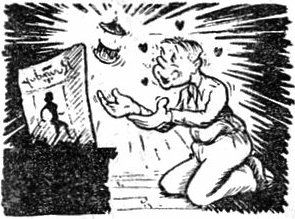
|
Even if the writer were big-hearted, he couldn't give the shirt off his back around here, not unless it had stripes on it... which mine hasn't. The billets have been dressing their bearers in tailor-made uniforms. But will Jeeves wear his without sergeant's stripes? Not and be happy.
Here's some hot stuff - A professional fire-eater. A guy who has been carrying the torch and eating it, too, for a living ever since he was 13. Pvt. O. S. Long, of the Turret Section, was going to gobble a bit of flame for us, but he got rained out.
Straight from the keyhole, we have news that Boomer (short for Boomerang), comely black cocker spaniel wench who joined the squadron in Australia, is anticipating.
Things I'm going to remember: Two lister bags hanging on the mess hall porch, one full of ice-cold lemonade, the other with ice water. S/Sgt. V. D. Davis standing beside them, grinning a welcome as we come in off the line and make a rush to be the first under the spigots with our mess cups... Standing in a coat of lather watching the brisk shower die away to a drip... The first time my mess kit was dive-bombed by a hawk... The pies and cakes baked by Cpl. Fong F. Shing, who is still waiting word from his wife and two children in Jap-held Canton.
 WASHINGTON - This week your Congress acquitted itself well in the eyes of America when
the House passed the Reciprocal Trade Act, 342-65. It was dear to the heart of good, gray Mr. Hull. During the past
nine years his trade agreements with foreign nations were negotiated entirely in the State Department.
WASHINGTON - This week your Congress acquitted itself well in the eyes of America when
the House passed the Reciprocal Trade Act, 342-65. It was dear to the heart of good, gray Mr. Hull. During the past
nine years his trade agreements with foreign nations were negotiated entirely in the State Department.
Before the act was brought to the House for renewal, big guns of the State Department and many New Deal pop-guns in bureaucracies sounded off to say the passage of the act would be an "acid test" whether the country intended to "cooperate" with nations after the war.
After the war was the key phrase. Everyone realizes in the war world there is little to trade and negotiate with other countries. Perhaps Mr. Hull had not best served either the cause of unity, home or abroad, by insisting so violently that Congressional action on the Bill was a vital index to its willingness to collaborate with the post-war world.
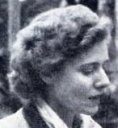
|
Many Congressmen, both Democratic and Republican, are against treaties only because they sincerely believe they injured farmers or manufacturers of his own district. To be told to vote against trade treaties was to vote economic isolation, but many Congressmen were on the spot in the way they felt that it was unfair. But on the spot they were. Of that there could be no doubt. In vain they sweated and swore in cloak rooms, vowing, damn it all, they were not isolationists because they were against trade treaties which had hurt the farmer, potter or hog grower in their districts.
In the end they went 342 strong and plopped for treaties. Only 65 (11 were Democrats) spines, stiffened by sectional pressures or political prejudices, stood up with heads bloody and unbowed before the nasty word, isolation.
As natural, most opposition on the Reciprocal Trade Bill came from out of the Republican camp. By an overwhelming teller vote (196-153), wherein many Democrats joined, they did get one amendment into the bill, which in no way crippled it, changed its intent or was hostile. This amendment cut the time of the act from the original three years to two. The Republican editing job was not overly distressing, either. Most members of the State Department took it for having served notice on the New Deal that, come 1945 and the new Congress, that Congress wants once again to review Mr. Hull's handiwork.
But Mr. Hull's pardonable pride of authorship was outraged. At once, he put pressure on Democratic House leaders to demand a roll call vote on a two-year amendment. But House leadership, acting wisely in the interests of national unity refused a roll call on the controversial amendment, which it felt would revive isolationist witch-hunting.
Thus, both parties in Congress gave a little and took a little. In effect, a decent compromise was reached, always a sign a democratic body is functioning. The historic function of Congress has always been to prevent anything done in exactly the way the other fellow wants it done. So Mr. Hull and the Democratic party have their trade treaties, but the opposition has the satisfaction of whittling a year off their duration.
Today both sides of the aisle Congressmen are saying, "If foreign nations want to make something of that - well, then they are just too darn touchy." The best opinion of those on the Hill who know foreign nations is that they won't make anything of it, but will rely instead on the lesson that casualties during the next two years will teach America that this is one very small world and that between nations, as between political parties within a nation, there must be a spirit of decent compromise of give and take, above all on the formulation of trade policies.
CLOAKROOM GOSSIP: This week, Congressmen gossiped about President Benes of Czechoslovakia's address to Congress, which nobody could understand because of the scholarly patriot's thick accent. But everybody thought it
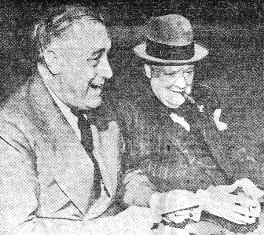 For the fifth time, President Roosevelt and Prime Minister Churchill met to discuss war strategy, when the British
leader "dropped in" to visit the White House last week.
For the fifth time, President Roosevelt and Prime Minister Churchill met to discuss war strategy, when the British
leader "dropped in" to visit the White House last week.
|
There was proud talk about the son of Congressman H. Streett Baldwin, of Maryland - Lt. Harry Baldwin, First Fighter Command, missing in April action in Tunisia, during which he is credited with bringing down two Junkers convoy planes. This is the third casualty among 230 soldier-sailor sons and grandsons of Congressmen.
Prime Minister Churchill's visit, which was combined with the fact he brought Field Marshall Wavell, Sir Richard Pierse and Brehon Somervell with him, that Gens. Stilwell and Chennault were here, and that Gen. MacArthur and Admiral Halsey had a big get-together in the Far East or Southwest Pacific, caused armchair dopesters to say that this talk is just eyewash and a military red herring is being drawn across the true plan, which is imminent invasion of the continent via Greece, Spain, Norway or where have you. It is wise talk that at last our Allied Chiefs-of-Staff are showing great sense by waging this global war of nerves on both ends of the Axis.
Amazed over talk about the Republican boomet, "MacArthur for President," led by New York's Representative Ham Fish and Michigan's Senator Arthur Vanderburg, hundreds of MacArthur's friends and millions of his fans, who know the general himself disapproves, were occasioned much distress.
There is sorrowful talk about the sudden death by heart failure of Republican whip, vigorous, able Congressman Harry Englebright of California.
There is excited talk about the way Claire Chennault convinced the War Department about the possibilities of doing big things in China.
There is unconfirmed talk about Madame Chiang Kai Shek's going home under the protective wing of Gen. Stilwell.
There is talk about what the boys will think of it all when they come marching home. Will they favor American policing of the world, along with Britain and Russia, or will they favor hands off Europe and its ancient, hopeless squabbles? For in the cloakrooms they know the boys, when they come home, will do the big deciding. Even today the most-often quoted letters about any subject from strikes to cradle-to-the-grave legislation are those which come from soldiers on the battlefronts. One thing that everybody on the Hill knows is that World War II veterans will pipe the tune of the postwar world. The strange fact is that the most important and influential constituents are out of the country fighting overseas and ain't saying nuthin'!
The C.B.I. Roundup is a weekly newspaper published by and for the men of the United States Army Forces in China, Burma, and India, from news and pictures supplied by staff members, soldier correspondents, the United Press and Office of War Information. The Roundup is published Thursday of each week and is printed by The Statesman in New Delhi, India. Editorial matter should be sent directly to Lt. Floyd Walter, Rear Echelon, Hq., U.S.A.F., C.B.I., New Delhi, and should arrive not later than Monday in order to make that week's issue. Pictures must arrive by Sunday and must be negatives or enlargements. Stories should contain full name and organization of sender.

MAY 20, 1943
Original issue of C.B.I. Roundup shared by Ruth Canney, widow of CBI veteran John Canney.
Note: The illustration in the story "Lush, Glamorous Female Awaits Lonely Lad's Return To Billet"
is reproduced on this page as it was printed in the original Roundup, backwards.
Copyright © 2007 Carl Warren Weidenburner

TOP OF PAGE PRINT THIS PAGE ABOUT THIS PAGE SEND COMMENTS
PREVIOUS ISSUE CLOSE THIS WINDOW NEXT ISSUE
